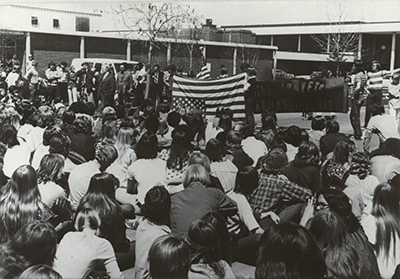1960s Roland Dille, President 125th Anniversary Timeline
From the moment he was inaugurated as MSC president in November 1968, Roland Dille recognized that he was delicately balanced on a tightrope (see excerpts from Dille's inaugural address, November, 1969). As a champion of human rights, he had helped create Project E-Quality and supported the free-speech rights of the students, even as more minority students came to the campus and a growing number of the kids protested American foreign policy. Dille adopted a stance that combined support of free expression with a lasting "faith in the traditions which teach that we learn from the past in science, in history and in literature." Trying to uphold tradition while encouraging changes to satisfy the desires of the baby boomers that had poured into colleges in the late 1960s – this was something that could break the ablest of college administrators. More than a few presidents lost their jobs when they were perceived as either too harsh or too lenient toward the students.
Dille realized the full dimensions of the challenge soon after Project E-Quality began to receive media attention. “One morning I found paint spattered on my car and a racial epithet advising that the project should be shut down.” During 1968 and 1969, he received numerous letters from angry parents, business leaders, and others strongly criticizing his willingness to let the “radicals” speak their minds. “I cannot see how you allow these nasty-mouthed kids to run down the country,” wrote one, “you should slap them down at once!” A few months later, a regional FBI agent gave one of Dille’s administrators the names of two students, assuring him that “these boys are communists” and promising to arrest them if MSC would search their rooms for evidence. Dille ignored the covert offer; “neither of those two students could have organized a study group, let alone a revolution.”
Not that Dille received applause from the students for refusing outside police help. The 1969 Mistic staff, and later the Independent Mystic, routinely excoriated him for his decisions. And from the other side of the controversy, a group of more conservative students came to Dille and asked him to fire one of the faculty, Dr. Charles Magel, because Magel had criticized President Nixon’s Vietnam strategy and suggested impeachment. Dille replied that Magel had the same rights to free speech as they did. A member of the local rotary wrote Dille that he was “shocked” to see Magel at a local meeting wearing a peace button; “fire him,” the man wrote. As he did with most every such letter, Dille replied explaining that he defended the right of choice for student and faculty, citizen and parent. “No one has a perfect grasp of all truth,” he wrote to one parent. “Not that Charlie Magel ever thanked me,” he said later; “he criticized me for just about everything and gave me a pretty hard time – I thought he was wrong a lot, but it was his right to criticize."

The Spring of 1970 was the most dangerous time. Dille had hoped that he had gone through the worst of it after he suspended the Mistic in 1969. “The paper was published with state money and I was certain the state would have wrecked our budget if we had let that issue [with obscenity] go out, but I wasn’t happy to do it.” Divisive issues continued in the Fall of 1969, centering mostly on Vietnam, the ROTC presence on campus, and “loco parentis” matters like curfews, dorm inter-visitations, and alcohol use. These were challenging, certainly, but Dille and the activist students managed to keep the line of communications open, so much so that he praised the students at Christmas for “rational discussion.” But then Nixon decided to order US troops into Cambodia, and colleges nationwide exploded in protest at “widening the war.” The Kent State tragedy followed, and Dille’s tightrope was tauter than ever, shaking in the wind. “I got a call from the regional commander of the state police, offering to send me a group of officers. I told him he could not send any men in unless I requested them and I wouldn’t do that. Then the state commander of the National Guard called and told me that he could send me troops and a couple of weapons carriers in two hours. That was a crazy idea, just days after Kent State.” Dille supported a ceremony for the Kent State victims out by the campus flag pole. “St. Paul called to tell me they did not want the flag at half-mast. I said I had checked and it was not, but I really made a point of not looking during the ceremony and it probably was.”
The killing of two Black students by state troopers at Jackson State College, Mississippi, came about a week later. “The black students in Project E-Quality told me they did not want any faculty or administration, or white students, there as they met.” After they met, they told me they were going to go “on strike” and boycott classes to protest Jackson State.” Mindful of the likely violence if State Police or Guards came to the campus, Dille decided to support a full moratorium of all classes. He turned a blind eye when many students used the time to party rather than protest. The higher education administrators in St. Paul could have decided to push for his dismissal for permitting the moratorium. But Mankato State and a few of the community colleges followed with similar moratoriums and peace prevailed. Dille hung on to the tightrope, hoping for better days ahead.
